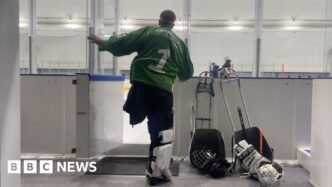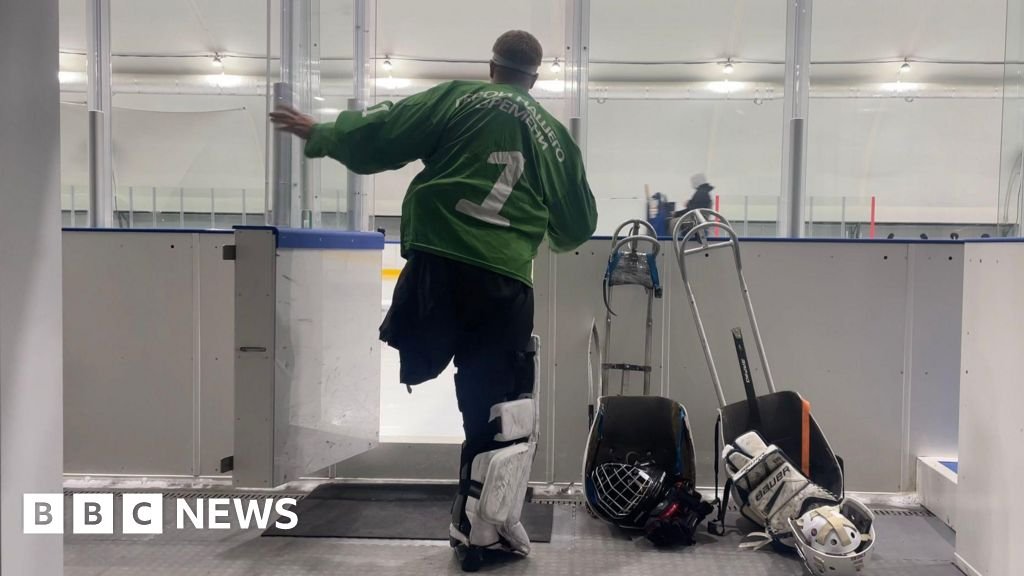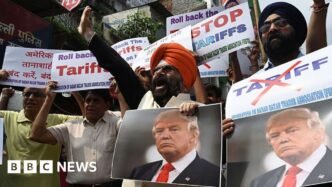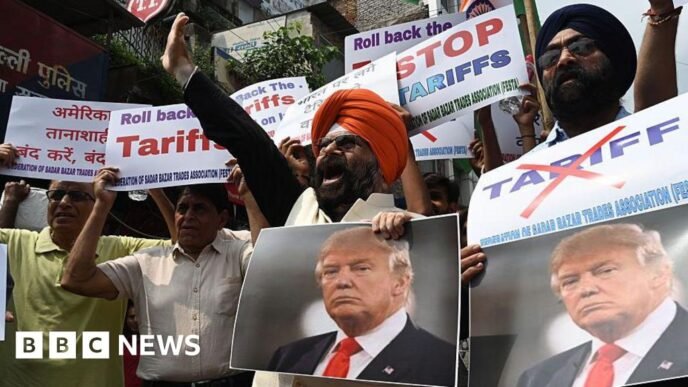Steve RosenbergRussia’s editor in Vladivostok
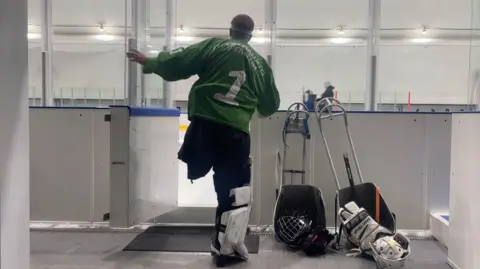 BBC
BBCIn an ice ski circuit in Vladivostok in the far eastern Russia, 30 -year -old Dmitry Avanasive is training with his teammates from Soyuz, the local paragraph team.
The players removed their artificial legs and sit in specially designed skipper. They use hockey sticks to push themselves around the ski circuit.
Dmitry hopes to one day be an ice hockey hero.
Achieving this will not be easy. The Russian teams were banned from the last handicapped games of the war in Ukraine.
Like all his teammates, Dmitry was on the front line.
“A mine is flying towards me,” said Dmitry, who was filled for fighting in Ukraine. “I fell to the ground and felt that my leg was burning. I looked down and everything was torn.
“My wife is a surgeon. So, I sent her a picture of my leg and answered:” They may see her. “Well, I said.
Vladivostok is located in the port of Vladivostok, more than 4000 miles from Ukraine and from the Russian capital. This is Asia. The border with North Korea is 80 miles from Vladivostok. China is only 35 miles.
However, the consequences of a distant war in Europe are more than visible.
In a cemetery on Tal, he overlooks Vladivostok, there are lines of fresh graves: Russian soldiers who were killed in Ukraine. In addition to the Orthodox Christian crosses, Russian military signs and trilogy are distinguished by every conspiracy.
In another section of the cemetery, a memorial for “the heroes of the private military operation” stands, the official brand continues to employ it in Russia’s war on Ukraine. Here there are more graves of the Russian soldiers and the statue of an armed Russian soldier.
“Soldiers live forever,” reading the engraving.
On the orders of President Putin, Russian forces flowed across the border with Ukraine in February 2022. The full conquest of Russia’s neighbor was seen as a Kremlin’s attempt to force Ukraine to return to the orbit of Moscow.
After more than three and a half years, the war begins.
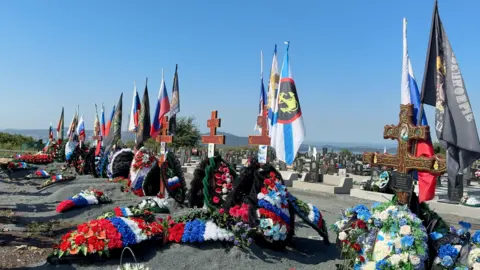
In the air, he often asked me: What does the Russian people think about the war in Ukraine, about confrontation with the West, and for President Putin?
“What does the Russians think?” It is a difficult question to answer.
After all, Russia is very large and varied. The largest country in the world extends two continents and 11 time regions. Some parts of Russia, such as Corsak and Baljuroud, border Ukraine.
Other Russian regions, such as Primorsky Krai where I am now away from fighting. Vladivostok is its administrative center.
This is the farthest that I traveled inside Russia since the beginning of the war. It is an opportunity to measure the mood in a completely different part of the country.
“Of course we are worried,” Svetlana told me at Vladivostok when I ask her about Ukraine. “This has continued for years so far and we want to end as soon as possible. We were hoping for the Alaska top [of Donald Trump and Vladimir Putin] It will change something. He did not.
“People are people. No matter whether they are British, Americans, Japanese, or Ukrainians, I don’t know where all hate comes.”
I get chat with Elijah, who claims that the war in Ukraine has not mainly changed his life in Russia.
“You can still gain a livelihood and get here,” says Elia.
“The standard of living does not rise, but it does not decrease either. However, we hope that relations with other countries will improve and we will reintegrate them into the global space.”
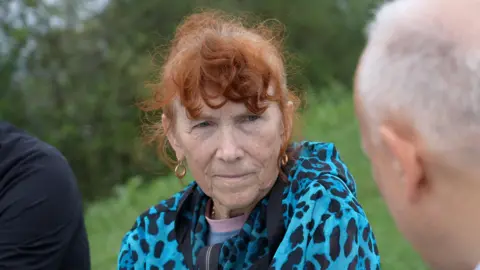
In the middle of Vladivostok, I stop listening to a group on the pedestrian street. I am not alone. A large crowd gathered to enjoy the improvised rock concert.
Among the songs, I speak to the main singer, a young local musician who calls himself Johnny London.
“Are people talking a lot about what is happening in Ukraine?” I inquire.
“People of my life, we don’t usually discuss these things. Not much. I will go to the extent that we are never talking about it.”
“Why?” Ask.
“We cannot do anything about it. It is outside our hands, out of our reach. We hope for a few years to return to normal.”
“What is normal?”
“No war, I think. It will be nice.”
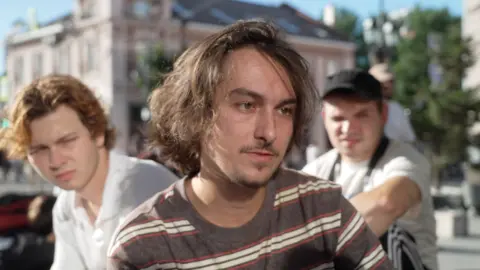
When I finish speaking to Johnny London, the retired is called VikTor. You got to know me. He saw me on television last year at a press conference with Vladimir Putin.
“I asked Putin a question, right?” Victor says. “You are with the BBC.”
Victor is a great fan. Not from the BBC, but from President Putin. He criticizes my “provocative question” to the Kremlin leader in the war in Ukraine, and he is defending Russia’s political system and targeting the Biden administration for the 2016 US presidential elections.
“With the help of polling via mail, Biden stole the elections from Trump,” Victor says.
“This is what Trump says,” I indicate.
“Not only Putin also says that,” Victor repeats.
“Putin says it does not make it true,” I suggest.
“Right”, Victor admits. “But this is what our people think.”
Victor also believes that the West loses strength and influence.
“See what is happening,” says Victor. “This week in China, the leaders of India, China and Russia met, and with many other countries as well. But there was no Trump, not Britain, not Germany, not France. India and China alone are three billion people.”
On his way back from China, Vladimir Putin, he stops in Vladivostok. Should I have the opportunity to ask another question another question, VIKTOR suggests that it should be about the “new world order”.
The city is preparing to visit the Kremlin leader and participate in the Eastern Economic Forum. On the side of the road that leads to the place, street artist Filipp Dulmachenko used 1,800 cans of aerosol paint to create an unusual image.
The giant mural depicts Vladimir Putin in military fatigue that embraces the Siberian tiger.
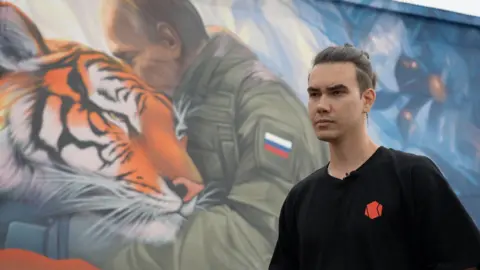
“Amur Tiger has always been a symbol of wildlife,” says Philip. “Waldimir Putin is a symbol of Russia.”
Philip told me that when a teenager was running with the police on the art of street. But Putin’s mural was officially approved by the regional authorities.
To accompany the image, the artist sprayed a short sentence: Philip says it is simply from the sunrise in the Russian Far East.
Nevertheless, with pictures of a tiger and a president believed to restore Russian power, the words seem to take a deeper meaning:
“Fajr begins here.”
https://ichef.bbci.co.uk/news/1024/branded_news/fc7c/live/70f916c0-88c6-11f0-b815-639f2ee95d1e.jpg
2025-09-03 23:18:00
